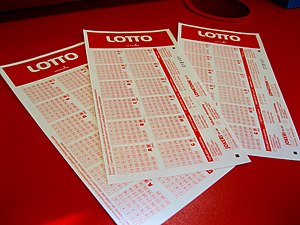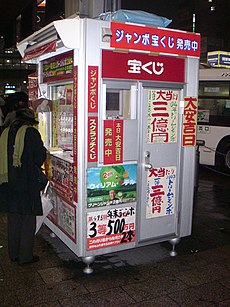Lottery
The lottery or loto is a betting game that can be developed openly to the public through tickets and raffles or developed as a table game consisting of cards and shuffles. Collecting lottery tickets is called loterophilia.
It is assumed that the name lotería comes from the Italian noun lotta, which means fight in Spanish, because apparently a fight is established between the player, luck and the contestants: others suppose that it is derived from the German lot, which means luck, because it is what one wants in the lottery and other gambling games. random. Another definition comes from the Latin "loterus" which was used in reference to the fate of individuals.
History
The earliest recorded evidence of lotteries are keno tickets in China under the Han Dynasty between 205 and 187 BCE. C. Keno is a type of lottery that is still played in Chinese casinos today. There is evidence that those ancient Chinese lotteries were government revenue that helped finance the construction of the Great Wall of China.
This game of chance is so old that in the description of the Saturnalia in Ancient Rome we see it already used by the Romans and it is suspected that they were its inventors to make these festivities more pleasant through games of chance. These began with a free distribution of tickets to the guests, who won an item of importance or merit in the case of being favored by luck: what had been written on the tickets was called apophaneta. By order of Augustus, extractions were made with prizes of little value, while Nero, to flatter the people, ordered the distribution of up to a thousand prize-winning tickets a day with which some families could make their fortune. Heliogábalo invented a very original lottery and it consisted of lots of high price combined with lots of very little value: for example, twelve slaves and twelve chickpeas, six silver and six clay vessels, one pound of fruit and one of gold. It seems that the reappearance of this game in modern Europe is due to the monk Celestino Galiano, who flourished in the 18th century and is said to have invented another game called the lotus, similar to the lottery.
Already in the European Middle Ages, the first records of lottery can be found in the Netherlands, where in the 15th century municipal authorities in Utrecht, Ghent, and Bruges financed public works by selling tickets to the public to participate in various raffles., and the first documented public drawing of lotteries occurred in Milan in January 1449 to finance the city's military campaigns against Venice; At that time in the Republic of Genoa there was the custom of casting lots for the names of the five senators who were to occupy certain positions. The Genoese Senate was made up of ninety members and for the draw fifty balls were put into a box, five of them marked, which were those of vacant positions. The public, who did not know the names of the ninety senators, placed bets on who might be the winners, which were the subject of true speculation. Several bankers were authorized to verify regular operations, for which reason a lottery was founded for the first time in 1629, which in a few years was imitated in the rest of Italy.
Following the Italian precedent, in Spain the lottery was introduced as a state monopoly in 1763, while in France, the lottery was not born until 1776, when the royal lottery was established under government sponsorship, which persisted after the French Revolution, it was used by the Consulate, the Directory and the Napoleonic era until it was abolished in 1836. Subsequently, this kind of game spread to the rest of Europe and then to America and the rest of the world, first under the auspices and guarantee from governments in the form of a state monopoly, and as a means of raising funds by selling tickets to a large number of gamblers. Starting in the 20th century, the lottery has become a large-scale industry, which does not limit its purposes to obtaining income for the State, and whose holders can not only be public authorities but also private companies subject to state regulation in several countries.
Lottery using tickets
The modern lottery is a game of chance that consists of matching the numbers of a previously purchased ticket with the numbers drawn from a tombola or a container that guarantees that they are drawn at random. The numbers of said ticket can already be pre-printed or be chosen by the people themselves. The number of hits can be all or part of the ticket numbers. The winner or winners are awarded a prize of money or valuable items. In general, if there are no winners for a draw, the prize accumulates for the next.
Some lotteries offer you a random or automatic bet, you just have to lean towards the one that tells you your winning instinct. A good option is to consult the statistics, referring to the hot numbers, which are extracted from the cold numbers. The idea is to look for the winning combination that has a lower frequency.
The lottery was originally a state monopoly, but in many countries it has lost that feature and can be a concession regulated by law; In these cases, there are usually prohibitions for individuals to organize lottery games that are not regulated or authorized by state regulations. A part of what is collected from the sale of lottery tickets in general is delivered to social charitable works or remains directly in the hands of the State and is destined for its current expenses; hence it is said that it is: "a voluntary tax". In this same fiscal order, the frequent use of lotteries as an instrument of fiscal fraud has been detected.
Lottery using cards and decks
It consists of a group of decks with determined figures and with several cards that contain a determined number of these figures ordered at random (eg 9, 12, 16). The players take cards and one of them also, prior to having perfectly mixed the deck, takes out the decks one by one and gives his name, this is called in Mexico, & # 34; sing the decks & # 34; or "cast the deck" or simply "sing them" or "throw them away". As they go "singing" the decks the players write down on their cards the ones they have. The first one to fill a card wins, that is to say that all the figures on it have come out and the player has noticed, because if they do not say that they "missed" the player will not be able to do it. and the game continues until he notices or someone else fills his card. It is common for there to be intermediate goals such as the first to achieve a figure in the center of the card (in case it has a central figure, eg, 3x3 or 5x5 figure cards), this is called "Bolazo" and other intermediate goals can be for the first to achieve "four corners" or "stripe" in a private carton.
It is common for this game to be played with money, for which a cooperation is set per card and the amount of the prizes for the ball, the line and the four corners, in case it is decided that they exist in addition to the The rest of the money collected for the cards used after paying the previous prizes is for the winner.
The lottery in Spain
In 1763, under Carlos III and his minister being the Marquis of Esquilache, the Royal primitive or old lottery was established in Madrid for the benefit of various pious establishments, having held its first draw on December 10 of that year.
By a royal decree of September 30, 1763, the first lottery was established in the town of Madrid, in imitation of the court of Rome and others, that is, the extraction of numbers in favor of hospitals, hospices and other pious works, under the assurances, method and rules that were believed to be conducive and printed for the government of the employees.
On July 20, 1763, by resolution of Carlos III and a circular of the Council of August 23 of the following year, the establishment of foreign offers in Spain was prohibited due to the abusive introduction of banknotes from various cities and towns they who benefited and dispatched in the kingdom, to avoid the export of cash under the penalty of 500 ducats (5,500 rs.) for the first time to each offender, divided between the denouncer, judge and prosecutor in equal parts; for the second, the sentence is doubled and for the third, four years in prison in addition to the 1,000 ducats fine.
In Spain there are only 3 companies that are officially authorized to sell lottery tickets. These include ONCE, State Lotteries and Gambling, and the Red Cross.
- National lottery of Spain
- Spanish Primitive Lottery
- National Organization of Spanish Blinds
- Bonoloto
- EuroJackpot lottery (Europe)
- EuroMillions lottery (Europe)
Lottery in America
- National Lottery of Argentina
- Concepción lottery (Chile)
- Chile (Chile)
- Baloto (Colombia)
- Lottery of Bogotá (Colombia)
- Lottery of Medellín (Colombia)
- Manizales lottery (Colombia)
- Costa Rica National Lottery
- National Lottery of Ecuador
- National Lottery of Charity of El Salvador
- California lottery (United States)
- Florida lottery (United States)
- New Jersey lottery (United States)
- Texas lottery (United States)
- National Lottery of Mexico
- Prognoses for Public Assistance (Mexico)
- National Lottery of Nicaragua
- National Lottery of Charity (Panama)
- National Lottery of Paraguay
- Tinka (Peru)
- Kabbalah (Peru)
- Daily Win (Peru)
- Puerto Rico Lottery
- 5 gold (Uruguay)
Venezuelan Lottery
- Tachira lottery
- Lottery of Caracas
- Lottery of Zulia
- Lottery of the East
- International Lottery of Margarita
- Lottery of Los Llanos
- Lottery of Aragua
- Carabobo lottery
- Lottery of Animalitos among them, the most popular is Active Lotto
Dominican Republic Lottery
- National lottery
- Lottery leidsa
- Lottery loteka
- Royal lottery
- Lottery Lotedom
Contenido relacionado
Annex: Basketball at the 1948 London Olympics
Biggs Darklighter
72nd edition of the Oscars





